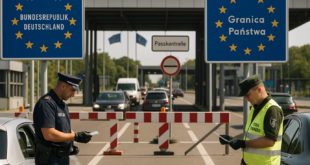Chancellor Angela Merkel has condemned the attacks in Wurzburg and Ansbach as “Islamic terror” but assured that the country will continue to offer refuge to those fleeing war and political persecution.
The attacks were shocking, distressing and depressing, the Chancellor said at a press conference in Berlin today (28 July). “Taboos of civilisation are being broken,” she said, referring to a series of deadly attacks in France, Belgium, Turkey and the US state of Florida as well as Germany. “These acts happened in places where any of us could have been.”
But she repeated her rallying cry of last year when Germany opened the borders to people fleeing war and persecution, many from Syria, which brought nearly 1.1 million migrants and refugees to the country in 2015. “I am still convinced today that ‘we can do it’ – it is our historic duty and this is a historic challenge in times of globalisation,” she said.
Merkel, who interrupted a summer holiday to face the media in the capital, assured that the authorities would do everything possible to investigate the terror acts. “We owe the victims and their families, our security and also the refugees who look to us for protection that much.”
The attacks in Wurzburg and Ansbach were committed asylum seekers, and two of the assaults were claimed by the Islamic State group. “They mocked the country that received them. Their actions make a mockery of both the helpers and volunteers and also the many other refugees seeking help from war and violence,” she said.
“The attacks put our relationship between freedom and security to test,” the chancellor noted, adding that the perpetrators would like to sow “hatred and fear between cultures and in our society”.
Merkel said many measures had been taken already to handle the security challenges. Examples include the citizenship withdrawal of potential terrorists, the improved cooperation between federal and state governments, the reintroduction of data retention, the termination of the careless handling of prepaid mobile phones and increase in the number of security agents. The top priority is to act where gaps existed, she said. “We will do everything to guarantee our liberty and liberal democratic order.”
Merkel reiterated that Germany as a strong country will meet the current challenges while staying true to its principles. Politically persecuted persons will continue to enjoy asylum and people fleeing war protection under the Geneva Convention, the Chancellor assured.
On 18 July, an asylum seeker from Afghanistan or Pakistan slashed train passengers and later a passer-by with an axe and a knife in Wurzburg before being shot by police. A 18-year-old German-Iranian shot and killed nine people and wounded more than 15 at a shopping centre in Munich two days later.
And on 24 July, a rejected Syrian asylum seeker blew himself up outside a music festival in Ansbach, wounding 15 people at a nearby cafe after being turned away from the packed open-air venue. The so-called Islamic State claimed both attacks.
Already steeped in grief and shock, Germans were further rattled by news that a Syrian refugee had killed a 45-year-old Polish woman with a large kebab knife at a snack bar in the southwestern city of Reutlingen on the day of the Ansbach attack in what authorities called a personal dispute.
Sola Jolaoso
 THE AFRICAN COURIER. Reporting Africa and its Diaspora! The African Courier is an international magazine published in Germany to report on Africa and the Diaspora African experience. The first issue of the bimonthly magazine appeared on the newsstands on 15 February 1998. The African Courier is a communication forum for European-African political, economic and cultural exchanges, and a voice for Africa in Europe.
THE AFRICAN COURIER. Reporting Africa and its Diaspora! The African Courier is an international magazine published in Germany to report on Africa and the Diaspora African experience. The first issue of the bimonthly magazine appeared on the newsstands on 15 February 1998. The African Courier is a communication forum for European-African political, economic and cultural exchanges, and a voice for Africa in Europe.






























